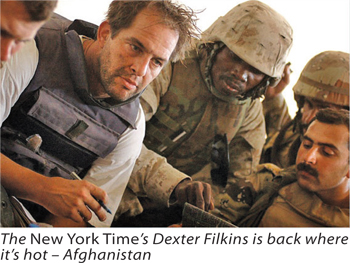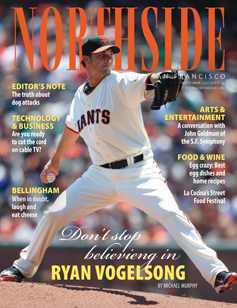|

From the Global Affairs Desk in North Beach
New York Times’s Dexter Filkins’s witness to history
By Matt McFetridge
 The American Colony Bar in Jerusalem is a place where people check their agendas at the door. Israelis, Palestinians, diplomats, aid workers, and journalists all mix and enjoy master barman Ibrahim’s wares in the cavernous, dimly-lit Cellar Bar. Back in 2002, the Bush administration’s Iraq saber rattling and U.S. troop deployments were in high gear. A very nice bar regular was the New York Times’s Dexter Filkins. We shared stories and information and wondered aloud about Iraq. Little did we both know that we would cross paths in post-invasion Baghdad in 2003. Little did I know that Filkins would become one of the best-known embedded correspondents in both Iraq and Afghanistan. He recently wrote a book entitled The Forever War (Knopf, 2008). We traded e-mails when Filkins was on assignment in Afghanistan. The American Colony Bar in Jerusalem is a place where people check their agendas at the door. Israelis, Palestinians, diplomats, aid workers, and journalists all mix and enjoy master barman Ibrahim’s wares in the cavernous, dimly-lit Cellar Bar. Back in 2002, the Bush administration’s Iraq saber rattling and U.S. troop deployments were in high gear. A very nice bar regular was the New York Times’s Dexter Filkins. We shared stories and information and wondered aloud about Iraq. Little did we both know that we would cross paths in post-invasion Baghdad in 2003. Little did I know that Filkins would become one of the best-known embedded correspondents in both Iraq and Afghanistan. He recently wrote a book entitled The Forever War (Knopf, 2008). We traded e-mails when Filkins was on assignment in Afghanistan.
I asked Filkins about those days in 2002 when we met at the Colony if he had any idea about the roller coaster ride he was in for.
No way. Of course. No way. I’d just covered the invasion of Afghanistan [after 9/11], and all that seemed over. Iraq was coming, or, I should say, looming, but it was still unclear what was going to happen. Jerusalem, as ever, felt like the center of the world. I could never have imagined the crucible through [which] we were going to pass.
And what a crucible we passed through. I saw Filkins again in April 2003 in post-invasion Baghdad. The Iraqis’ post-invasion euphoria of “no more Saddam Hussein” had worn off. What was startling to most reporters was just how broken Iraq was – no economy, government institutions that weren’t bombed by U.S. jets were looted by Iraqis, and an anti-American insurgency started makings violent noises. Iraq was a mess, and the press conferences Filkins and I both attended in Baghdad’s Green Zone were exercises in positive spin of a really negative situation. I asked the Viceroy, I mean Ambassador Paul Bremer, if the Bush administration had an after-plan for post-invasion Iraq, which made the press corps chuckle because we all knew they didn’t. I posed the same question to Filkins.
How did you see things unravel in 2003? It’s cool in your book when you talk about how your jogging trail got more and more restricted … and how the bombings of western targets became more frequent …
That’s a very complicated question. Iraq was a broken, traumatized society before we ever arrived. It was being held together by the steel frame of a very terrible dictatorship. We came and broke the frame, and the country fell apart in our hands. The United States might have been able to alleviate that calamity if it had made better decisions, and been better prepared. No question. But I doubt whether it could ever have been easy.
So, while Filkins was filing for the New York Times, he was also writing The Forever War, and I had to ask him:
Why that name?
I tried to write a book that would have not an intellectual effect on the reader, but an emotional one. I wanted to get down all the emotions and sensations I felt there – heartbreak, joy, disgust, and, most of all, confusion. The war feels like forever. I am not saying it will be; in fact I don’t think it will be. But down there in the middle of it, in the throes, it sure felt that way.
Probably the most poignant moment of your book is when Lance Cpl. William L. Miller took a bullet intended for you and your photographer in Fallujah … how horrible was that experience and why did you go see his family? How did Fallujah change from then to now?
How horrible? Well, I will have to refer you to the book.
Can you explain the upside and downside of embedding with U.S. troops? When you’re with them, do you forget about WMD fostering democracy, and the other labels the Bush spin machine was throwing on the Iraq War? Meaning, is it just about survival?
I never thought about Washington or Bush or any of that when I was in Iraq, embedded or not. The war was too intense for that, too immediate. For me, the war was an argument in the United States. It was real. Embedding is great – you can learn a lot, and a lot you can’t learn any other way. You just need to be mindful of the limitations.
Is President Obama right … is the U.S. losing in Afghanistan? If so why? Can the counterinsurgency lessons of Iraq be applied to Afghanistan?
I don’t recall President Obama saying that the United States is losing in Afghanistan. I think what he said is that they United States is not winning. I think that’s right. I’m in Afghanistan now, and the tragedy of the place is that it was such a low priority for so long. You can see that everywhere – in the wreckage of the country, in the return of the Taliban, in the resilience of al Qaida.
When I was embedded in Kandahar [Afghanistan], we did a med-comp [free medical care for Afghans] to a remote village south of Kandahar and by day it was U.S. territory, but at night it as Taliban country. Is that the problem in Afghanistan in a nutshell … the U.S. really isn’t in control?
I think your experience is emblematic of many things. But I don’t think it’s a question of U.S. control. I don’t think they want to control Afghanistan. What they want to do is turn it over to an Afghan government that can hold the country itself. We are nowhere near that.
Afghanistan is the world’s largest producer of opium, and the profits from the drug trade finance the resurgent Taliban and al Qaida. The challenge to the U.S.-led coalition there is to prevent Afghanistan from becoming a narco-terrorist rogue state. Dexter Filkins’s job is not finished as he covers another forever war.
Matt McFetridge is a two-time Emmy Award-winning television producer who has covered 20 wars in 20 countries over 20 years. E-mail: matt@northsidesf.com



|







 The American Colony Bar in Jerusalem is a place where people check their agendas at the door. Israelis, Palestinians, diplomats, aid workers, and journalists all mix and enjoy master barman Ibrahim’s wares in the cavernous, dimly-lit Cellar Bar. Back in 2002, the Bush administration’s Iraq saber rattling and U.S. troop deployments were in high gear. A very nice bar regular was the New York Times’s Dexter Filkins. We shared stories and information and wondered aloud about Iraq. Little did we both know that we would cross paths in post-invasion Baghdad in 2003. Little did I know that Filkins would become one of the best-known embedded correspondents in both Iraq and Afghanistan. He recently wrote a book entitled The Forever War (Knopf, 2008). We traded e-mails when Filkins was on assignment in Afghanistan.
The American Colony Bar in Jerusalem is a place where people check their agendas at the door. Israelis, Palestinians, diplomats, aid workers, and journalists all mix and enjoy master barman Ibrahim’s wares in the cavernous, dimly-lit Cellar Bar. Back in 2002, the Bush administration’s Iraq saber rattling and U.S. troop deployments were in high gear. A very nice bar regular was the New York Times’s Dexter Filkins. We shared stories and information and wondered aloud about Iraq. Little did we both know that we would cross paths in post-invasion Baghdad in 2003. Little did I know that Filkins would become one of the best-known embedded correspondents in both Iraq and Afghanistan. He recently wrote a book entitled The Forever War (Knopf, 2008). We traded e-mails when Filkins was on assignment in Afghanistan. 